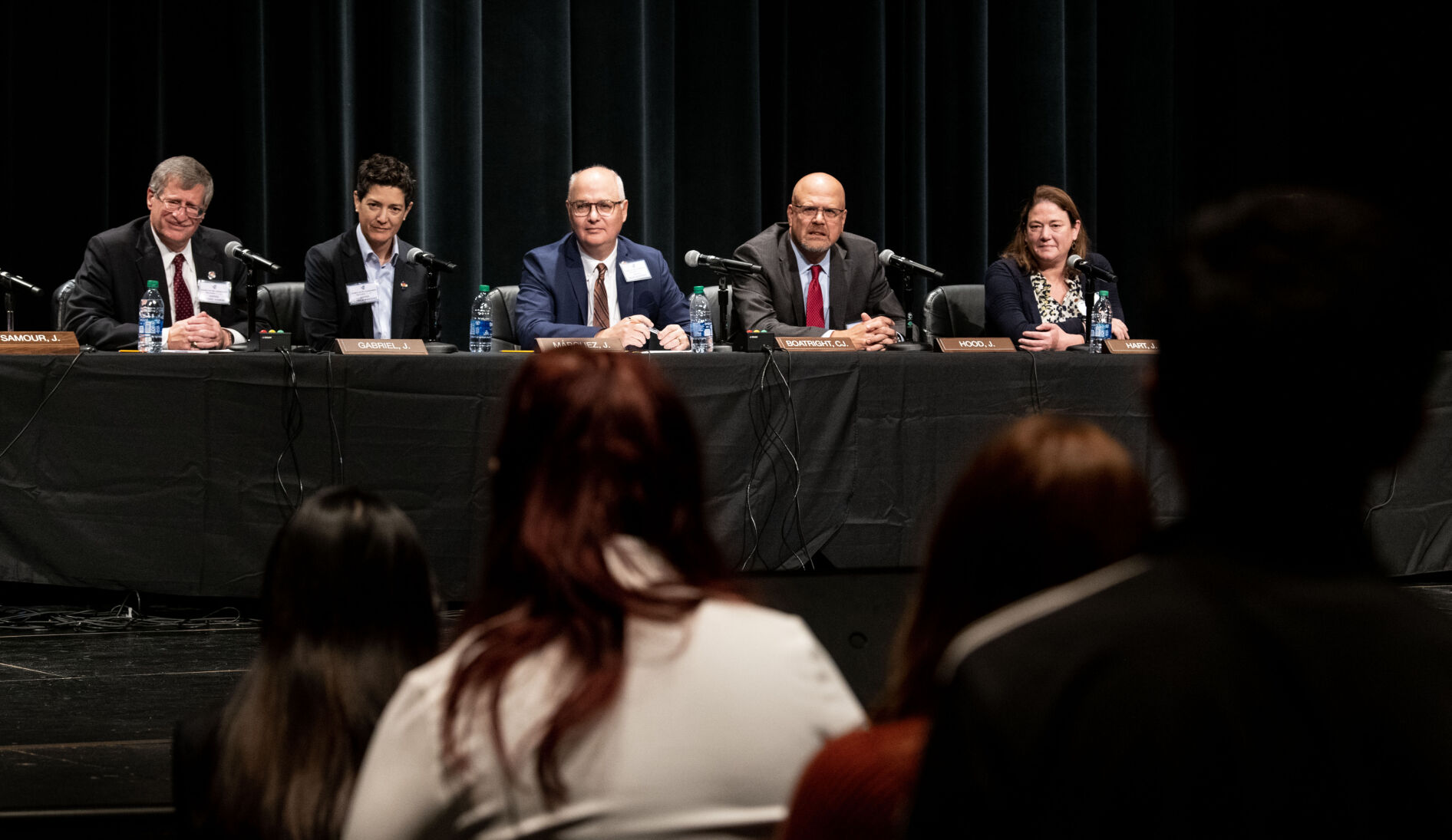Colorado Supreme Court to hear Miranda rights appeal from Arapahoe County

The Colorado Supreme Court on Monday announced it will hear a criminal appeal out of Arapahoe County that asks whether police failed to give a road rage suspect his Miranda warning, and if that failure requires a new trial.
At least three of the court’s seven members must agree to review a case.
The justices also signaled they may intervene in two matters currently in the trial courts. One case questions whether the terms and conditions of a ski pass render Vail Resorts not liable for a girl’s fall from a chair lift. The other involves the potential obligation defendants have to hand over evidence of alternate suspects to the prosecution.
Finally, the court ordered further review of two property tax challenges in light of its own recent rulings.
In custody or not in custody?
Aurora police arrived at the apartment building of Terrence Kenneth Eugene, wanting to ask him about a road rage encounter from March 2018. Although it was unclear whether Eugene or the other motorist started the fight, Eugene fled the scene and the other driver called authorities.
Police interrogated Eugene within a 27-minute window. Near the end, Eugene admitted to hitting the other driver, but denied being the instigator. An Arapahoe County jury convicted him of assault and he received eight years in prison.
Eugene attempted to have his incriminating statements excluded from trial, arguing he was interrogated in custody and, consequently, needed a Miranda warning. A trial judge disagreed with Eugene, but a three-judge panel of the Court of Appeals reversed Eugene’s convictions last fall.
The panel’s majority saw Eugene’s interrogation in three phases. First, Officer Christopher Thivierge questioned Eugene outside the building. Second, Thieverge left Eugene alone with other officers while he spoke to Eugene’s wife inside. Finally, Thieverge reengaged Eugene outside, which is when Eugene admitted to hitting the victim.
Judge Neeti V. Pawar, writing for the majority, believed that during the final portion of the interrogation, Eugene was effectively in custody and required a warning about his constitutional rights to silence and to an attorney. Eugene, Pawar explained, had his freedom curtailed similar to an arrest because officers separated him from his wife, ordered him to stay outside, lied to him about the existence of video evidence, and stood between Eugene and the building’s door.
“We emphasize that officers are free to use confrontational and coercive techniques that amount to custodial interrogation,” she wrote, “as long as they advise the suspect of his Fifth Amendment rights before doing so.”
Judge Steve Bernard disagreed. The officers did not point their weapons, they did not handcuff Eugene, they questioned him at his home and they never explicitly told Eugene he was prevented from leaving. Bernard acknowledged Eugene’s interrogation was neither a formal arrest nor a consensual interaction, but “for me, this case is closer to the not-in-custody end of the spectrum than the in-custody end.”
The government appealed to the Supreme Court, arguing the panel’s majority focused too much on the confrontational tone of the interrogation, and ignored the other evidence at Eugene’s trial suggesting he was the one who threw the first punch.
The Supreme Court will analyze whether the majority correctly determined Eugene was in custody, and that the lack of a Miranda warning required his convictions to be reversed.
The case is People v. Eugene.
The ski lift fall
Michael D. Miller and his teenage daughter, Annalea Jane Miller, traveled from their home in Oklahoma to Crested Butte Mountain Resort in March 2022. While trying to board the chair lift, Annalea Miller missed the bench and was swept onto the moving lift, hanging onto the chair. Multiple people allegedly yelled for an operator to stop the lift, but it continued up the mountain until Annalea Miller could not hold on any longer. She fell 30 feet and suffered permanent paralysis.
The Millers sued Vail Resorts, which owns the facility, for negligence and related claims. Vail moved to dismiss the lawsuit, arguing, among other things, the Millers’ passes contained a waiver of liability. The passholders assumed “all risks and dangers” and the “possibility of personal injury.” Among the specific risks mentioned were “misloading, entanglements, or falls from ski lifts.”
In April, Broomfield District Court Judge Sean Finn dismissed most of the Millers’ claims. In part, he relied on the waiver language.
“The parties do not dispute that Plaintiff voluntarily entered into these agreements in order to participate in a recreational activity,” he wrote. “The court finds that they were entered into fairly and that Plaintiff was advised of the relevant risks.”
The Millers turned to the Supreme Court, arguing state laws exist to hold resort operators responsible for safe operations. Therefore, resorts and customers cannot agree in a contract to sidestep that obligation.
“Allowing ski area operators to immunize themselves, through liability waivers, from civil liability for ski lift malfunctions would essentially allow ski area operators to disregard each and every provision of the (law) and defeat the legislature’s pronounced public policy,” wrote the Millers’ attorneys.
The Supreme Court ordered the resort to explain why Finn was correct to rule in its favor.
The case is Miller v. Crested Butte Mountain Resort, LLC.
Alternate suspect
Mark Burns faces a jury trial in early 2024 for allegedly murdering Michael Arnold and Donna Gallegos in Delta County. Burns intends to dispute that he was the killer, and that an alternate suspect was really responsible.
In July, District Court Judge Steven L. Schultz ordered the defense, prior to trial, to disclose the identity of the alternate suspect, the facts applicable to the suspect and the “evidentiary hypothesis” supporting the suspect’s guilt.
To allow the defense to keep such information to themselves until trial “would literally turn the established pre-trial process into the wild west, and reinstate a system based on trial by ambush,” Schultz wrote.
Burns immediately sought the Supreme Court’s intervention. Procedural rules require disclosure of the “nature” of a defense, but he argued Schultz’s order went far beyond that. It would violate Burns’ due process rights, his lawyers explained, to force him to assist the government in proving its case.
The Supreme Court directed the prosecution and Schultz to respond. The justices are currently evaluating a similar case out of Weld County, where a trial judge ordered the defense to disclose its alternate suspect evidence to the government.
The case is People v. Burns.
Property valuations and COVID
Earlier this year, the Supreme Court addressed a subset of virtually identical lawsuits – out of 11 total – claiming county assessors should have considered commercial property owners’ requests for lower property valuations in 2020 due to the COVID-19 pandemic. Under their theory, property owners could not fully use their commercial spaces because of public health restrictions on capacity and operations, and their 2020 tax bills should have been reduced as a result.
The Supreme Court disagreed and ordered the cases dismissed in May.
However, by that point the Court of Appeals had already decided two cases in favor of the property owners. The Supreme Court has now returned those decisions, out of Weld and Eagle counties, to the Court of Appeals for reconsideration.













